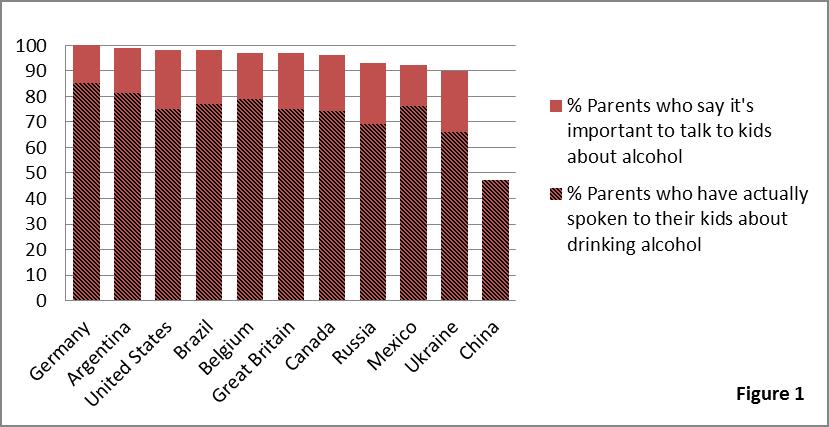Saying that parents are the most important influence on their children is like saying that the sky is blue or the ocean is vast—we all know it. So it isn’t surprising that independent research has shown time and again(无数次,屡次,一再) that while factors like peer pressure play a part, parents are the largest influence on children’s attitudes toward drinking alcohol. For example, according to a 2009 report from U.S. Department of Health and Human Services’ Substance Abuse and Mental Health Services Administration, teens who talked to their parents about the dangers of substance abuse were “less likely than those who did not have such conversations to have been past month users of…alcohol (16.2% vs. 18.3%).”
What does this mean for underage-drinking prevention? Parents are the most important factor in this effort. We should be talking with our children about drinking—and we should start early and speak often.
Research shows that parents know this already. A recent survey by Ipsos, a global market research firm, on behalf of our company polled 1,000 adults each in 11 different countries about how they are talking with children about drinking. Respondents overwhelmingly agreed that it’s important for parents to talk with their children about alcohol. In 10 of the 11 countries surveyed, more than 90% of parents of kids aged 5-17 polled agreed with this statement.
However, the study also showed a gap in most countries between those parents who think it’s important to talk with their children about alcohol, and those parents who actually have done so (see Figure 1).
Where does this gap come from? According to the survey, in each country we polled, the number one reason why parents hadn’t talked with children about drinking was because they thought their child was too young to have the conversation. In the U.S., for example, 89% of parents gave this reason, but the U.S. surgeon general actually recommends that “it’s never too early to start talking with young people about the dangers of underage drinking.”
Other reasons stated for avoiding the subject was that they trusted their children to make the right decision, or that they weren’t sure how to start the conversation. It can be awkward to talk with our children about making responsible choices, whether he is nine or 15, but experts tell us the sooner we begin this dialogue, the better chance we have to guide their decision-making.
And parents shouldn’t have to go it alone. To help parents with these conversations, for example, AB InBev launched Family Talk About Drinking, an underage drinking prevention program developed by experts in the areas of education, counseling and family counseling, more than 20 years ago in the United States. Today, in collaboration with local experts, the program is now available in 10 countries, in the local languages. Family Talk gives parents resources, from suggested conversation starters to supportive online communities, to help them talk with their children about drinking. There are also similar excellent parent programs offered by Mothers Against Drunk Driving; the U.S. government; and in our other markets around the world like Brazil and Mexico.
It’s also important to acknowledge that parents are not the only solution. The effects of underage drinking impact each one of us, and we are all responsible for helping to address the challenge. We at AB InBev have also pledged to provide ID-checking materials to 500,000 bars, clubs, restaurants and grocery stores worldwide by the end of 2014 to help them prevent sales to minors. We have also committed to training at least 1 million bartenders, waiters and others around the world who serve and sell our beers on responsible alcohol beverage sales.
Reducing underage drinking is a complex challenge that requires all of us to work together to ensure the next generation makes the right decisions about alcohol to not drink when they are young—and that they enjoy responsibly once they are of legal age, if they choose to drink. As a mother of 15-year-old and 12-year-old daughters, I am committed to helping achieve this goal.



